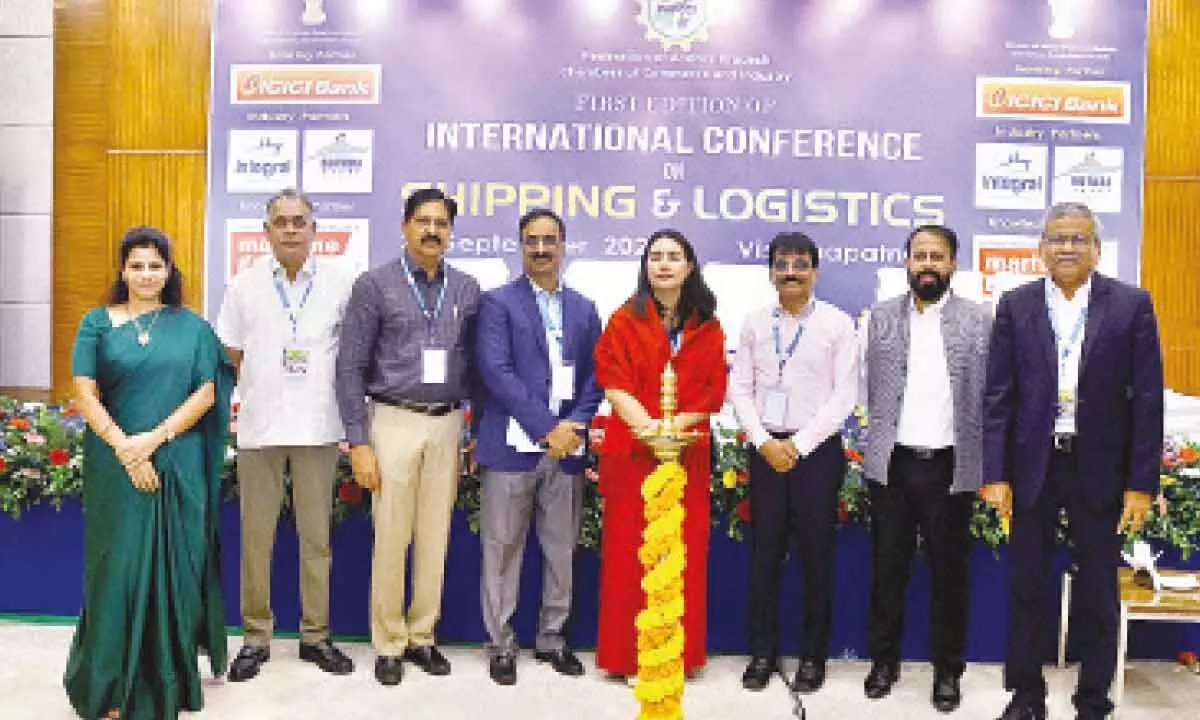Strengthening AP’s maritime infra on cards: APMB official
To boost exports from the State, the government along with the Centre, is supporting industries and traders by developing a favourable ecosystem
image for illustrative purpose

Ports of late are not being called as ports and they are treated as terminals paving the way for industrialisation in the vicinity. The Centre through PM Gatishakti is trying to attract investments from private partners for faster evacuation of cargo and reduction of logistics cost - Lt Cdr BM Ravindranath Reddy, Deputy CEO, APMB
Visakhapatnam: AP Maritime Board Deputy CEO Lt Cdr BM Ravindranath Reddy on Friday said the State Government is firm on developing more new ports in addition to Mulapeta, Machilipatnam, Ramayapatnam and Kakinada Gateway to boost port-led development.
He was speaking at the first edition of an international conference on shipping and logistics organised by Federation of AP Chambers of Commerce and Industry (FAPCCI).
He said ports of late are not being called as ports and they are treated as terminals paving the way for industrialisation in the vicinity. He said APMB is developing new ports with the support of the Central Government and the private partners. He said most of the cargo being received from major ports like Visakhapatnam Port Authority is from the hinterland areas like Odisha, Telangana, Chhattisgarh and Jharkhand.
He said the government is committed to boost exports from the State by supporting industries and traders through infrastructure development and a favorable ecosystem. He also highlighted the crucial role of dry ports in handling significant export and import volumes and mentioned how the Centre through PM Gatishakti is trying to attract investments from private partners for faster evacuation of cargo and reduction of logistics cost.
Reddy in his speech emphasised their goal to stimulate regional economic growth by leveraging Central Government’s Gati Shakti initiatives and the State Government’s logistic policy. He underlined the significance of dry ports in the global supply chain. Addressing the meeting, Mercy Epao, the Joint Secretary for SMEs, Government of India, underscored the role of the MSME industry in achieving a $5 trillion Indian economy. She said MSMEs contribute 49 per cent of exports, 30 per cent of GDP and have become the largest employer after agriculture. She also explained about various incentives being offered by the Government of India to encourage capacity building of first time exporters.
She highlighted a range of initiatives to nurture MSME growth, including credit support, enterprise development, formalisation, technological assistance, infrastructure development, skill training, and market support. The introduction of the Udyam Assist Platform (UAP) aims to integrate Informal Micro Enterprises (IMEs) into the formal sector, granting them access to Priority Sector Lending (PSL) benefits.
Karunendra S Jasti, FAPCCI president, expressed the inspiring potential of aligning Central Government policies like PM Gati Shakti initiatives and the National Logistics Policy with Andhra Pradesh’s dynamic logistics policy. Andhra Pradesh’s strategic location and extensive coastline position makes it as a vital player in international trade. In FY 2023, the State’s merchandise exports reached an impressive $19.32 billion, with marine products contributing significantly.
To bolster this growth, the AP Government is investing in logistics infrastructure, industrial parks, warehouses, SEZs, and tailored incentives, aiming to enhance the business environment.
G Sambasiva Rao, MD of Sravan Shipping Services Pvt Ltd and vice president of the National Association of Container Freight Station, emphasised that cities with coastal locations like Visakhapatnam have tremendous development opportunities, thanks to their strategic geography and growing infrastructure.
Infrastructure development is paramount, including modernizing transportation networks (roads, railways, airports) and establishing intermodal transportation hubs to improve connectivity, efficiency, and cost-effectiveness. Simplifying customs procedures and adopting digital documentation would enhance Ease of Doing Business (EoDB).
Experts in the shipping and logistics sector believe that technology adoption, such as GPS tracking, RFID tags, and AI, can enhance logistics network performance, reduce costs, and boost customer satisfaction. Logistics digitization improves supply chain management, reducing costs and improving service.
Kankatala Mallikharjuna Rao, vice president of FAPCCI, commended the speakers for their insightful contributions in crafting a strategic plan to elevate the shipping and logistics sector to greater heights.
Delegates from Sri Lanka, Bangladesh and Colombo participated in a panel discussion on “Ports and Allied Infrastructure and Coastal Shipping: Prospects and Challenges,” offered insights into coastal shipping, bulk cargo, the South Asian container market, and global perspectives.

